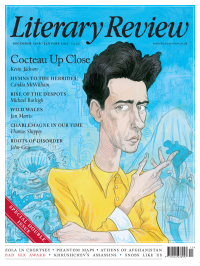Nigel Andrew
Beware the Cassowary
Where Song Began: Australia's Birds and How They Changed the World
By Tim Low
Yale University Press 406pp £20
Big, loud, belligerent, gregarious, fiercely competitive – in many ways Australia’s birds conform to the negative stereotype of their human compatriots. Happily, though, these less than attractive traits are not the only things that make Australia’s birds distinctive, as Tim Low, an eminent field biologist, explains in this illuminating and engaging study. They are at the very heart of the story of the world’s birds: it is to Australia that the world owes all its songbirds, parrots and several other bird groups.
Low begins with the most obviously striking traits of Australian birds – their harsh calls and aggressive behaviour, not only towards their own species but also towards any other animal that might attract their ire, including humans. Brisbane has an estimated five hundred people-attacking magpies – one or

Sign Up to our newsletter
Receive free articles, highlights from the archive, news, details of prizes, and much more.@Lit_Review
Follow Literary Review on Twitter
Twitter Feed
How to ruin a film - a short guide by @TWHodgkinson:
Thomas W Hodgkinson - There Was No Sorcerer
Thomas W Hodgkinson: There Was No Sorcerer - Box Office Poison: Hollywood’s Story in a Century of Flops by Tim Robey
literaryreview.co.uk
How to ruin a film - a short guide by @TWHodgkinson:
Thomas W Hodgkinson - There Was No Sorcerer
Thomas W Hodgkinson: There Was No Sorcerer - Box Office Poison: Hollywood’s Story in a Century of Flops by Tim Robey
literaryreview.co.uk
Give the gift that lasts all year with a subscription to Literary Review. Save up to 35% on the cover price when you visit us at https://literaryreview.co.uk/subscribe and enter the code 'XMAS24'